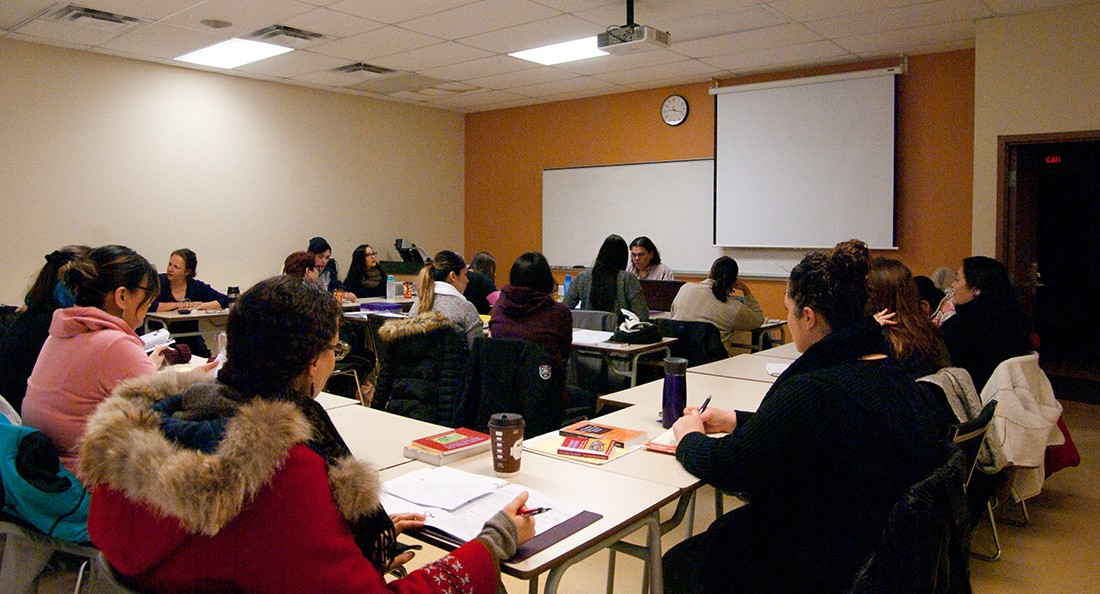Big turnout for Ojibwe language course
Language immersion course looks to keep the culture alive
The classroom is packed with mostly women. They all look in awe as a delivery person from Feast Bistro pulls out foil trays filled with steaming bison meatballs, fresh bannock and other First Nations delicacies.
The instructor, Darren Courchene, takes a few small helpings from each item of food and asks Gloria Gregory, from Rolling River First Nation, to say a prayer over the meal. The plate of food is passed to her, and she seems nervous at first. She makes a few jokes and the rest of the class laughs, but she struggles to remember how to start the prayer.
Courchene suggests a few phrases she could start with. Then Gloria runs with it, saying in Ojibwe that she acknowledges all of creation for the food and says that she hopes this food nourishes us, and sustains us.
Gloria Gregory and her sister Marie enrolled in the introduction and intermediate Ojibwe immersion courses to help keep the language alive on their reserve. Marie is looking to speak the language, while Gloria is trying to re-learn some of the trickier words.
“Ojibwe was my first language,” Gloria says. “Me and my brother are the only ones in our family that know how to talk (in Ojibwe). My sister can …”
“Understand,” Marie says.
“Understand it, but can’t talk it. I guess she could do it if she tried, but she claims that she sounds funny,” Gloria goes on.
“Yeah, I put the emphasis on the wrong part of the word, which totally changes what you’re trying to say,” Maria says while laughing.
Courchene is the instructor for both the Ojibwe language courses. He says he didn’t expect such a great response to the course.
“When I checked WebAdvisor on Tuesday, there were only about three students registered for the course. I was like ‘oh, this will be interesting, three students,’” Courchene says. “When I saw that 35 people came today, I said ‘wow.’ I’ve never had that many students get into a language program.”
If you wanted to greet someone in Ojibwe, you would say “Boozhoo” (pronounced: Bow zsh oh). This comes from the name of a central figure in Ojibwe spirituality, Nanabozho. Nanabozho has a storied history in Ojibwe lore, but he promises to return to earth when he is really needed. “Boozhoo” is a greeting that honours him, while also asking the person you are greeting if they are the reincarnation of Nanabozho.
According to Statistics Canada, out of the more than 60 Canadian Indigenous languages, only three will survive the passage of time: Ojibwe, Cree and Inuktitut. There are so few people left speaking languages like Mohawk and Southern Haida that they’re at risk of dying out completely.
Marie and Gloria say that the Ojibwe language is in danger on their reserve. Some of them can understand the language, but they can’t carry a conversation in it.
“(My children) understand because their grandmother, on their dad’s side, didn’t know how to speak English at all … She’d talk to them (in Ojibwe) … so they understand it a bit, but not to the point where they can talk it. I don’t either, but I can if I have too,” Marie says.
“My daughter understands a bit of it. They all know the swear words,” Gloria says, laughing with Marie.
For more information, contact Sarra Deane at [email protected].
Published in Volume 71, Number 19 of The Uniter (February 9, 2017)







